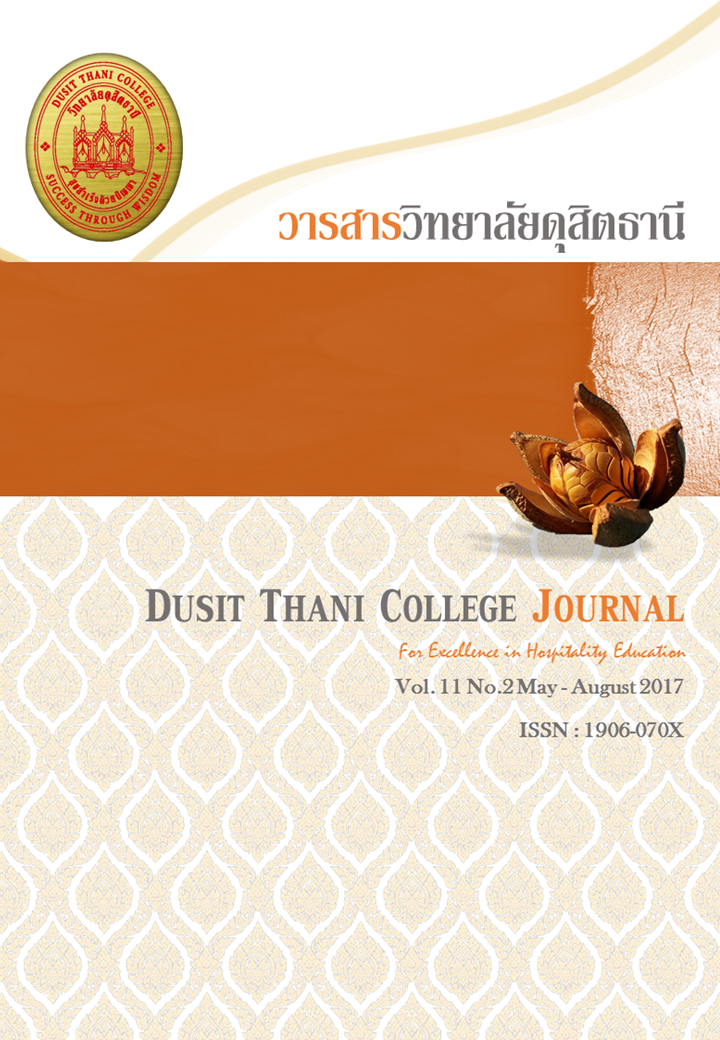แนวทางการเพิ่มศักยภาพการบริการด้านที่พักเพื่อการท่องเที่ยวของจังหวัดนครราชสีมา Guidelines to Increase Accommodation Service Capacity for Tourism of Nakhonratchasima Province
Main Article Content
บทคัดย่อ
การวิจัยครั้งนี้มีวัตถุประสงค์เพื่อ 1) ศึกษาความคาดหวังของนักท่องเที่ยวต่อการบริการด้านที่พักของจังหวัดนครราชสีมาในปัจจุบัน 2) ศึกษาการรับรู้ของนักท่องเที่ยวต่อการบริการด้านที่พักของจังหวัดนครราชสีมาในปัจจุบัน 3) ศึกษาความพึงพอใจของนักท่องเที่ยวต่อการบริการด้านที่พักของจังหวัดนครราชสีมาในปัจจุบัน และ 4) เสนอแนะแนวทางการเพิ่มศักยภาพการบริการด้านที่พักของจังหวัดนครราชสีมา เป็นการวิจัยเชิงปริมาณ (Quantitative Research) และวิจัยเชิงคุณภาพ (Qualitative Research)
การวิจัยเชิงปริมาณ ใช้แบบสอบถาม (Questionnaire) เป็นเครื่องมือเก็บรวบรวมข้อมูล ความคาดหวัง และการรับรู้ของนักท่องเที่ยวชาวไทย จำนวน 384 คน วิเคราะห์ด้วยสถิติเชิงพรรณา (Descriptive Statistics Analysis) โดยใช้การแจกแจงค่าความถี่ (Frequency) ค่าร้อยละ (Percentage) ค่าเฉลี่ย (Mean) และส่วนเบี่ยงเบนมาตรฐาน (Standard Deviation) และใช้สถิติPaired Sample T-test และ F-test ในการทดสอบสมมติฐาน
การวิจัยเชิงคุณภาพ ใช้วิธีการสัมภาษณ์เชิงลึก (In-depth Interview) แบบมีโครงสร้าง (Structured Interview) เพื่อกําหนดแนวทางการพัฒนาศักยภาพการบริการด้านที่พักของจังหวัดนครราชสีมาโดยทําการสัมภาษณ์กลุ่มผู้จัดการโรงแรมหรือหัวหน้างานแผนกต่าง ๆ ด้านที่พัก ประเภทโรงแรมระดับ 3-4 ดาว ในจังหวัดนครราชสีมา เกี่ยวกับความคิดเห็นและข้อเสนอแนะ และวิเคราะห์ข้อมูลเชิงเนื้อหา
ผลการวิจัยพบว่า นักท่องเที่ยวชาวไทยมีความคาดหวังต่อการบริการด้านที่พักของจังหวัดนครราชสีมาในด้านการให้ความมั่นใจแก่ลูกค้าสูงที่สุด และมีการรับรู้ต่อการบริการด้านที่พักของจังหวัดนครราชสีมาในด้านการให้ความมั่นใจแก่ลูกค้าสูงที่สุดเช่นกัน เมื่อคำนวณหาค่าความแตกต่างของการบริการทั้ง 5 ด้าน ตามหลักคุณภาพของการบริการ พบว่า นักท่องเที่ยวชาวไทยมีความคาดหวังต่อการบริการด้านที่พักของจังหวัดนครราชสีมาน้อยกว่าการรับรู้ในทุกด้าน แสดงว่านักท่องเที่ยวชาวไทยมีความพึงพอใจมากต่อการบริการด้านที่พักของจังหวัดนครราชสีมา
แนวทางการพัฒนาศักยภาพการบริการด้านที่พักของจังหวัดนครราชสีมาดังนี้ 1) ด้านความน่าเชื่อถือหรือไว้วางใจได้ ควรมีมาตรการในการควบคุมสถานประกอบการด้านที่พักที่ไม่สามารถทำตามข้อตกลงและเงื่อนไขการโฆษณาหรือโปรโมชั่นได้อย่างถูกต้อง เพื่อเป็นการรักษาผลประโยชน์ให้กับนักท่องเที่ยว 2) ด้านการตอบสนองความต้องการควรมีการแจ้งให้นักท่องเที่ยวทราบและให้เหตุผลทุกครั้งเกี่ยวกับการให้บริการที่เปลี่ยนแปลงไปจากที่ได้ตกลงไว้กับนักท่องเที่ยว และควรมีขั้นตอนการให้บริการที่สะดวก รวดเร็ว ไม่ยุ่งยากซับซ้อน 3) ด้านการให้ความมั่นใจ กิจการควรส่งเสริมให้พนักงานควรปฏิบัติงานด้วยความซื่อสัตย์สุจริตพนักงานควรมีกิริยา มารยาทสุภาพอ่อนโยนและเป็นมิตร 4) ด้านความเห็นอกเห็นใจ สถานประกอบการควรส่งเสริมให้พนักงานควรมีการเอาใจใส่ลูกค้าแต่ละคนอย่างเท่าเทียมกันและ 5) ด้านสิ่งที่สัมผัสได้ สถานประกอบการควรจะตกแต่งอาคารสถานที่ให้สะอาดและสวยงามอยู่เสมอควรมีการโฆษณา การให้บริการในสื่อต่าง ๆ เป็นประจำ
Article Details
นโยบายการพิจารณากลั่นกรองบทความ
- บทความวิจัยและบทความวิชาการทุกเรื่องที่จะได้รับการตีพิมพ์ต้องผ่านการพิจารณากลั่นกรองโดยผู้ทรงคุณวุฒิ (Peer Review) ในสาขาที่เกี่ยวข้อง จำนวน 3 ท่าน/บทความ
- บทความ ข้อความ ภาพประกอบและตารางประกอบที่ลงตีพิมพ์ในวารสารเป็นความคิดเห็นส่วนตัวของผู้เขียน กองบรรณาธิการไม่จำเป็นต้องเห็นด้วยเสมอไป และไม่มีส่วนรับผิดชอบใด ๆ ถือเป็นความรับผิดชอบของผู้เขียนแต่เพียงผู้เดียว
- บทความที่จะได้รับการตีพิมพ์จะต้องไม่เคยตีพิมพ์ เผยแพร่ที่ใดมาก่อน และไม่อยู่ระหว่างการพิจารณาของวารสารฉบับอื่น หากตรวจสอบพบว่ามีการตีพิมพ์ซ้ำซ้อน ถือเป็นความรับผิดชอบของผู้เขียนแต่เพียงผู้เดียว
- บทความใดที่ผู้อ่านเห็นว่าได้มีการลอกเลียนหรือแอบอ้างโดยปราศจากการอ้างอิง หรือทำให้เข้าใจผิดว่าเป็นผลงานของผู้เขียน กรุณาแจ้งให้กองบรรณาธิการวารสารทราบจะเป็นพระคุณยิ่ง
เอกสารอ้างอิง
กระทรวงการท่องเที่ยวและกีฬา. (2551). แผนยุทธศาสตร์และกลยุทธ์พัฒนาการท่องเที่ยวกรมการท่องเที่ยวพ.ศ.2555– 2559. กรุงเทพฯ : กรมการท่องเที่ยว.
กุณฑลี เวชสาร. (2553). การวิจัยการตลาด. กรุงเทพฯ : โรงพิมพ์แห่งจุฬาลงกรณ์มหาวิทยาลัย.
ฉัตรชัยคงสุข. (2535). ความพึงพอใจของผู้รับบริการของแผนกคลังพัสดุฝ่ายภัตตาคารและโภชนาการภายใน ประเทศบริษัทการบินไทยจำกัด (มหาชน). สารนิพนธ์ปริญญามหาบัณฑิต.มหาวิทยาลัยธรรมศาสตร์.
ฉัฐชสรณ์กาญจนศิลานนท์. (2555). คุณภาพบริการ: ความจำเป็นของการพัฒนาคุณภาพบุคคลากรในธุรกิจโรงแรม. บทความวิชาการ: มหาวิทยาลัยศรีปทุม.
ยุพาวรรณวรรณวาณิชย์. (2548). การตลาดบริการ. กรุงเทพฯ : สํานักพิมพ์มหาวิทยาลัยเกษตรศาสตร์.
สำนักงานพัฒนาเศรษฐกิจและสังคมแห่งชาติ, (2558). แผนพัฒนาเศรษฐกิจและสังคมแห่งชาติ ฉบับที่ 11 พ.ศ. 2555-2559 .สืบค้นเมื่อวัน 3เมษายน2559จากhttps://www.nesdb.go.th/main.php?filename=index
สำนักงานสถิติแห่งชาติ. (2557). แผนพัฒนาสถิติจังหวัดนครราชสีมา. สืบค้นเมื่อวัน 3 เมษายน 2559 จาก https://osthailand.nic.go.th/masterplan_area/userfiles/files/
Farley, M. J.. (1989). Assessing Communication in Organization. JOHN, 19, 12.
Gronroos, C.. (1990). Service Management and Marketing: Managing the Moments of Truth Service Competition. Lexington, MA: Lexington Books.
Hokey Min, Hyesung Min, Kyooyup Chung. (2002). Dynamic Penchmarking of Hotel Service Quality. Journal of Services Marketing, 16(4), 302 – 321.
Kotler, P.. (1997). Marketing Management. Upper Saddle River., NJ: Prentice Hall.
Maslow, Abraham H. (1954). Motivation and Personality. 1stEd. New York: Harper and Row Publisher Inc.
Parasuraman, A., Berry, L. L., & Zeithaml, V. A. (1991). Refinement and Reassessment of The SERVQUAL Scale. Journal of Retailing, 67(4), 420-50.
Parasuraman, A. (1998). The Roles of Price, Performance, and Expectations in Determining Satisfaction in Service Exchanges. Journal of Marketing, 62(4), 46-61.
Parasuraman, A., Zeithaml, V. A., & Berry, L. L. (1985). A Conceptual Model of Service Quality and Its Implications for Future Research. Journal of marketing, 49(Fall), 41-50.
RaykaPresbury, Anneke Fitzgerald และRoss Chapman. (2005). Impediments to Improvements in Service Quality in Luxury Hotels. Journal of Services Marketing, 15(4), 357 – 373.


